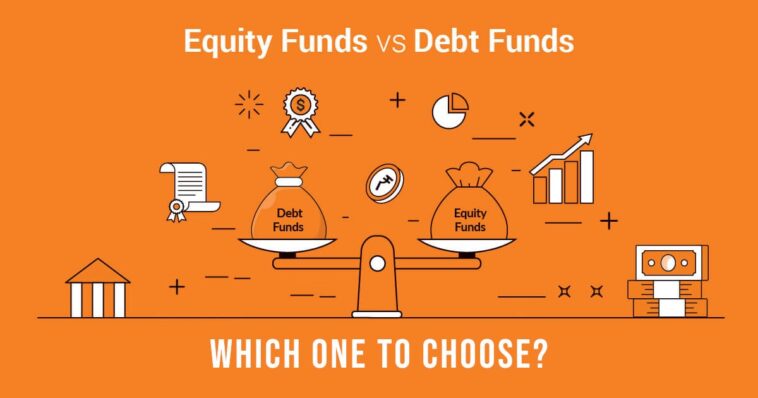When it comes to investing in mutual funds, individuals are often faced with a choice: debt fund or equity fund? Which one is right for their financial goals and risk tolerance? This decision could significantly impact their financial success. Therefore, it is important to understand the nuances between equity vs debt fund to make an informed choice.
Equity Funds
Equity funds are mutual fund investments investing primarily in stocks of different companies across sectors, thus offering diversification. The main aim of equity funds is to provide high returns over the long term, and they are considered more suitable for risk-taking investors with an investment horizon of over five years.
Debt Funds
On the other hand, debt funds, sometimes known as income or bond funds, invest primarily in fixed-income securities like government bonds, corporate bonds, and treasury bills. These funds aim to provide stable and regular income and are preferably chosen by conservative investors who are looking for safer investment options with shorter investment horizons.
By understanding the key differences and considerations, investors can make an informed choice about how to invest in mutual funds.
The primary aspect investors need to consider while choosing between equity and debt funds is the risk involved. Equity funds are exposed to market risk as they are influenced by market dynamics, and can sometimes lead to substantial gains or drastic losses, depending on market trends.
On the contrary, the risk in debt funds is relatively lower as they deliver fixed returns, even though these returns can be influenced by interest rates and credit risk. For instance, if an investor has invested ₹1,00,000 in a debt fund offering an annual interest rate of 10%, they can expect a return of ₹10,000 at the end of the year, irrespective of market fluctuations.
Time Horizon
Another significant factor to consider is the time horizon of the investment. Floating on the volatile ocean of the share market, equity funds are more receptive to market fluctuations in the short term, but tend to provide significantly higher returns in the long term, making them more suitable for investors with a longer investment horizon.
Debt funds, by their nature, are more predictable and stable. They offer moderate returns and are a more suitable choice for investors looking for short-term to medium-term investment horizons.
Taxation
Apart from risk and time horizon, taxation is also an important point of consideration. Equity funds are taxed under the tax laws for capital gains. For instance, if the holding period exceeds one year, then long-term capital gains of up to ₹1 lakh are exempt from tax, and anything above this is taxed at 10%.
In contrast, in debt funds, if the holding period is less than three years, then the gains are added to your income and taxed as per the income slab you fall under. If you hold the debt fund investment for more than three years, you are subject to 20% tax after indexation.
While the lure of high returns might tip the scale in favor of equity funds, the stability and predictability offered by debt funds should not be overlooked. In the end, the choice between equity and debt funds should be guided by an investor’s individual financial goals, risk tolerance, and investment horizon.
Disclaimer: Trading in the Indian financial market is subjected to market risk and it’s highly recommended for investors to do thorough research and consider all the pros and cons before investing.
See also: SIP Calculators: The Tool for Predicting Your Investment Growth
This post was created with our nice and easy submission form. Create your post!





